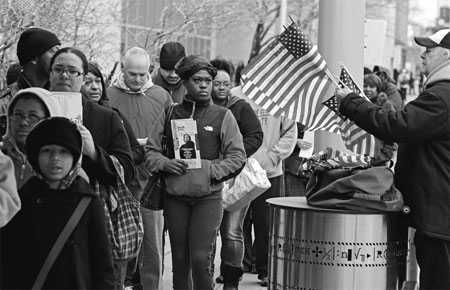Obama, Romney in full-court press
|
Voters wait in line outside the Cuyahoga County Board of Elections in Cleveland on the final day of early voting on Monday. About 1.6 million people have voted early in Ohio. Mark Duncan / AP |
US President Barack Obama and Republican presidential challenger Mitt Romney raced from one battleground state to another in the final day of campaigning before Election Day, trying to fire up core supporters with an emphasis on the high-stakes choice between two highly contrasting visions for the future of the US.
Nationwide polls show the two locked in one of the closest, and most expensive, presidential races in recent US history. The hard-fought contest has laid bare one of the most polarized American electorates in decades choosing between very different paths for the world's most powerful country. Uncertainty over the outcome weighed on investors worldwide.
Obama and Romney highlighted their sharp disagreements on the role of government in fixing problems from a stubbornly high unemployment rate to a $1 trillion-plus deficit. Amid a painfully slow recovery from the Great Recession, the economy is foremost on the minds of voters. The candidates' opposing views on other issues from gay marriage to abortion have added to the divisive atmosphere.
"This is not just a choice between two candidates or two parties. It is a choice between two visions," Obama told nearly 20,000 people in Wisconsin.
"Our choice tomorrow is going to lead to very different outcomes," Romney said at a rally in Virginia.
A majority of polls in the battleground states - especially in Ohio and other Midwestern states of Iowa and Wisconsin- show Obama with a slight advantage. That gives him an easier path to the 270 electoral votes needed for victory.
No Republican has won the White House without carrying Ohio, an industrial Midwestern state that has picked the winner in the last 12 elections.
Ohio was the only state both candidates were visiting on Monday. And Romney's campaign announced in the afternoon that the Republican nominee would come back on Election Day for a rally in the Cleveland area. Romney also planned a Tuesday stop in the Pittsburgh area.
Under the US system, the winner is not determined by the nationwide popular vote but in state-by-state contests, making nine "battleground" states that don't consistently vote Republican nor Democratic extremely important in such a tight race. Winning a state gives Romney or Obama that state's electoral votes, which are apportioned to states based on representation in Congress.
This year's tight race raises the possibility of a replay of the chaotic 2000 election when Bush won the presidency with an electoral vote majority while Democrat Al Gore had a narrow lead in the nationwide popular vote.
Both Obama and Romney say this year's winner will be determined by which of their campaigns can get the most supporters to the polls.
Obama even raised the possibility of defeat as he pleaded with listeners of The Rickey Smiley Morning Show to get to the polls. "If we don't turn out the vote, we could lose a lot of the gains we've already made," Obama said.
The president needs the support of blacks and Hispanics to counter Romney's support among white men, but his campaign knows that the feeling of making history by electing America's first black president that fired up the 2008 campaign has cooled. Rock legend Bruce Springsteen and rapper Jay-Z joined Obama for Ohio events on Monday.
Romney, too, mused aloud that he might lose. In Cleveland, boos from Romney's partisans turned to appreciative laughter when the Republican nominee began a sentence by saying, "If the president were to be elected," and ended it with, "It's possible but not likely."
The cost of the presidential campaign has surged past $2 billion.
Obama insists there is no way to reduce the staggering debt and safeguard crucial social programs without asking the wealthy to pay their "fair share."
Also at stake Tuesday is control of Congress, with all House seats and a third of Senate seats up for grabs. Republican were expected to retain control of the House while Democrats were expected to narrowly defend their majority in the Senate, meaning that whoever wins the White House will likely have to contend with similar partisan struggles as those that dogged Obama's term.
The final national NBC/Wall Street Journal Poll, released on Sunday, showed Obama with the support of 48 percent of likely voters, with Romney receiving 47 percent. The poll had a margin of error of 2.55 percentage points.
The final national poll from the Pew Research Center found Obama with a three-point edge over Romney, 48 percent to 45 percent among likely voters, an improved showing that indicates the president may have benefited from his handling of the response to last week's Superstorm Sandy. Obama suspended three full days of campaigning to deal with the East Coast disaster. The Pew poll had a margin of error of 2.2 percentage points.



















